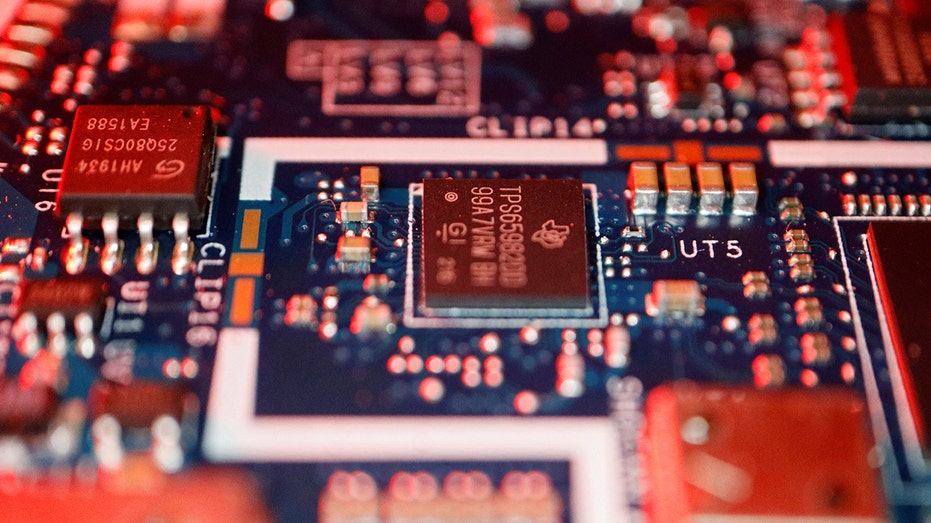Chipmakers push back on US restrictions on semiconductor exports to China
Chipmakers say going too far in curbing semiconductor exports to China could hurt US manufacturers
Biden ‘projecting weakness’ to China is threat to America: James
Rep. John James, R-Mich., joined "Mornings with Maria" to discuss President Biden’s trip to Europe, U.S. foreign policy and the Russia-Ukraine war.
Executives from leading U.S. semiconductor manufacturers met with the Biden administration on Monday as the largest trade group representing chipmakers pushed back against expansion of restrictions on chip exports to China.
The White House is mulling a fresh round of restrictions on chip exports to China amid longstanding geopolitical tensions and an escalating chip war that has seen the U.S. and China each impose restrictions on semiconductors made by the other due to national security concerns.
The Semiconductor Industry Association (SIA) released a statement in which it argued that more stringent controls on chip exports to China could undercut investments made under the CHIPS Act by reducing the global market for semiconductors made in America.
CHINA SLAPS RESTRICTIONS ON US COMPANY OVER ‘NATIONAL SECURITY’ RISKS AS CHIP WAR ESCALATES

The U.S. is weighing new restrictions on exports of advanced computer chips to China. (Reuters / Florence Lo / File / Reuters Photos)
"Allowing the industry to have continued access to the China market, the world’s largest commercial market for commodity semiconductors, is important to avoid undermining the positive impact of this effort," the SIA said in a statement. "Repeated steps, however, to impose overly broad, ambiguous, and at times unilateral restrictions risk diminishing the U.S. semiconductor industry’s competitiveness, disrupting supply chains, causing significant market uncertainty and prompting continued escalatory retaliation by China."
The trade group has cited data that shows China accounted for $180 billion in semiconductors last year, which made it the world’s largest single market for chips as that total amounted to more than one-third of the global market of $555.9 billion.
It urged the U.S. government to "refrain from further restrictions until it engages more extensively with industry and experts to assess the impact of current and potential restrictions to determine whether they are narrow and clearly defined, consistently applied, and fully coordinated with allies."
US ‘WON’T TOLERATE’ CHINA’S BAN ON CHIPMAKER MICRON

U.S. Secretary of State Antony Blinken meets with Chinese President Xi Jinping in the Great Hall of the People in Beijing in June. (Leah Millis / Pool Photo via AP / File / AP Newsroom)
Among the Biden administration officials who met with chip industry leaders were Secretary of State Antony Blinken, Commerce Secretary Gina Raimondo, National Security Council Director Jake Sullivan and National Economic Council Director Lael Brainard, sources familiar with the meetings told Reuters.
Intel, Qualcomm and Nvidia were the chipmakers in attendance at the meeting, according to Reuters. Nvidia recently began exporting a modified version of one of its advanced chips to China to work around the U.S. government's export controls.
| Ticker | Security | Last | Change | Change % |
|---|---|---|---|---|
| NVDA | NVIDIA CORP. | 185.41 | +13.60 | +7.92% |
| INTC | INTEL CORP. | 50.59 | +2.35 | +4.87% |
| QCOM | QUALCOMM INC. | 137.34 | +1.04 | +0.76% |
The U.S. is reportedly weighing new restrictions on exports of advanced chips used in artificial intelligence systems to China, although the Biden administration is reportedly undecided about what the threshold for computing speed for such chips should be.
UNITED STATES LOOKS TO ENSURE CHINA DOESN’T BENEFIT FROM $52B CHIPS ACT

U.S. Treasury Secretary Janet Yellen recently traveled to Beijing to meet with Chinese officials in a bid to ease tensions. (Pedro Pardo / Pool Photo via AP / File / AP Newsroom)
The export control would build off a set of rules implemented in October and could be paired with a new executive order that restricts outbound investment in Chinese firms involved with sensitive technologies like AI.
"Our actions have been carefully tailored to focus on technology with national security implications, and designed to ensure that U.S. and allied technologies are not used to undermine our national security," a White House National Security Council spokesperson said.
GET FOX BUSINESS ON THE GO BY CLICKING HERE
Chipmakers also discussed ways to speed up the disbursement of CHIPS Act incentives for semiconductor firms. The bipartisan CHIPS Act was signed into law last year and includes $39 billion in manufacturing subsidies intended to boost U.S. firms’ domestic production of high-end chips, in addition to billions more in tax credits.
Reuters contributed to this report.




















